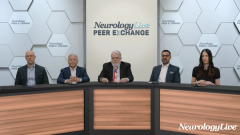
Quality of Life in MG
Experts in neurology highlight taking age and quality of life into consideration when approaching treatment of MG, as well as comment on the standard of care for patients.
Episodes in this series

This is a video synopsis/summary of a panel discussion involving James Howard, MD; Nicholas Silvestri, MD, FAAN; Tuan Vu, MD; Ali Habib, MD; and Beth Stein, MD.
The discussion delves into the administration of treatments for myasthenia gravis (MG), emphasizing its impact on patients' quality of life. Traditionally, Intravenous immunoglobulin (IVIG) has been the go-to therapy for disease exacerbations, but this paradigm is shifting with the emergence of newer therapies, each with its own unique administration methods.
The insidious progression of MG often sets a new normal for patients, leading them to attribute symptoms to aging rather than disease progression. Physicians must engage patients in conversations about the risks and benefits of trying new treatments, challenging the notion that certain limitations are solely due to age.
Moreover, as MG symptoms are brought under control, it's crucial not to attribute every symptom to the disease itself. Patients may have other comorbidities contributing to their symptoms, requiring a comprehensive approach to management.
The term "refractory" is controversial, with physicians acknowledging that almost every patient responds to some degree of treatment. However, there's a push to redefine success in MG management, aiming for optimal control with minimal side effects.
Physicians note varying experiences with treatment efficacy, influenced by factors like patient demographics and practice settings. With the goal of achieving no symptoms and minimal adverse events, the consensus is that a significant portion of patients can achieve better outcomes with current therapies. Practice settings may influence success rates, with university-based practices potentially encountering more complex cases.
Overall, the conversation highlights the need for a patient-centered approach to MG management, with an emphasis on individualized treatment plans and realistic expectations for outcomes.
Video synopsis is AI-generated and reviewed by NeurologyLive editorial staff.
Newsletter
Keep your finger on the pulse of neurology—subscribe to NeurologyLive for expert interviews, new data, and breakthrough treatment updates.














